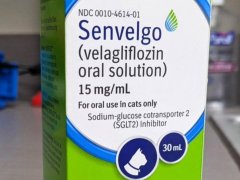
Cryptographer / Shutterstock.com
Molnupiravir is an antiviral medication used to treat feline infectious peritonitis (FIP) in cats. In this article, you’ll learn more about how molnupiravir is used to treat cats with FIP, side effects to look for, and how it is obtained legally for use in the United States.
Molnupiravir for Cats Overview

About Molnupiravir for Cats

A cat with a fluid swelling of the abdomen is a common appearance with FIP, which molnupiravir can treat. Animals/Wildlife / Shutterstock.com
Molnupiravir is an antiviral medication that is used to treat cats with feline infectious peritonitis (FIP). It is also referred to as EIDD-2801.
Molnupiravir was originally developed as a treatment for the viral disease COVID-19 in people, which, like FIP virus, is also a coronavirus.
This prompted interest in its use to treat feline infectious peritonitis virus. Early on, it was only used as an effective rescue treatment for FIP, which is caused by a mutation of feline enteric coronavirus. This is where standard treatment, usually with another antiviral like GS-441524, is not successful.
However, more recent studies have also shown that when used as a first line treatment, it does have similar efficacy to GS-441524 and remdesivir in case series. Survival rate in cats with FIP when treated with molnupiravir, remdesivir, or GS-441524, have been described to be about 85% or greater.
Molnupiravir is not commercially available in the United States. However, it can be legally prescribed as a compounded medication through compounding pharmacies. It’s important to note that the compounded forms are not identical to those used in clinical studies but are still considered effective treatment forms.
While GS-441524 is considered the recommended standard medication for initial treatment of FIP, it can be expensive. Molnupiravir costs significantly less and may serve as a more affordable option in appropriate cases.
Dosing Information for Cats
The following information should not be used to replace a veterinary visit or alter your vet’s prescribing information. You should never use a human medication in your cat that was prescribed for you or a family member without consulting your own vet.
Molnupiravir is not labeled for use in cats. When used, veterinarians prescribe it in an off-label manner. Commercial medication availability varies by country, possibly due in part to its teratogenic effects but also as a reserve medication to treat COVID-19 in humans.
While the commercial form is very difficult to obtain in the US, the compounded forms are readily available and legal for veterinarians to prescribe through a licensed compounding pharmacy.
The suggested dose for molnupiravir treatment ranges from 10-20 mg/kg, depending on the form of FIP that is present. Dosing may also depend on whether it is being used as an initial treatment for FIP or as a rescue therapy when other antivirals have failed to work. Doses are usually given every 12 hours.
The standard treatment duration is 12 weeks.
You should stay in close contact with your veterinarian regarding the correct dose for your cat’s prescription and if a dosage adjustment is needed at any point during the treatment period.
How To Administer Molnupiravir to Cats

Molnupiravir can come in a capsule form. It’s important to follow up administering a capsule to your cat with a small amount of water. RJ22 / Shutterstock.com
Molnupiravir is compounded into capsule and oral liquid suspension dosage forms.
The capsule may be hidden in food or a small treat like a Pill Pocket. For additional tips, see our article on the best foods to hide pills in.
The liquid suspension is best when given directly by mouth. Multiple flavor options are usually available to help make giving the medication easier.
Side Effects of Molnupiravir for Cats
Molnupiravir is generally well tolerated by cats and adverse events appear to be uncommon. The most common side effects are related to stomach upset:
- Hypersalivation/drooling
- Nausea
- Vomiting
- Reduced appetite
Anecdotally, cats have shown signs of their ears appearing folded and fragile or having broken whiskers. Most agree the clinical importance of these effects is low. They appear to resolve when treatment is complete.
Serum alanine transaminase (ALT), a liver blood work value, has been reported to increase but the relevance is unclear if this is related to the medication or the presence of FIP in affected cats.
When Not To Use Molnupiravir in Cats
Molnupiravir is known to be a teratogenic compound. This means it can cause birth defects in fetuses when given to someone who is pregnant. This has led to its limited availability in the US.
In cats, molnupiravir should not be used in pregnant queens or in any cats used for breeding. In these cases, different antiviral treatment options (like GS-441524 or remdesivir) should be used.
Overdose and Emergencies
There is little information about overdoses of molnupiravir in cats. More pronounced digestive upset signs may be seen.
It’s important to keep in mind that some FIP cats are extremely ill when treatment is started. Initial improvement with treatment requires at least about 3 days and some severely affected cats may deteriorate before treatment benefits can be seen. This appears to occur at a low percentage in FIP treatment studies, but occurs with any of the medications used, and has not been connected to medication side effects.
As there is little information on overdoses or toxicity of molnupiravir, if you suspect your cat received an overdose make sure to immediately contact one or more of the following for advice:
- Your veterinarian
- ASPCA Animal Poison Control Center (1-888-426-4435)
- Pet Poison Helpline (1-855-764-7661)
Potential Drug Interactions With Molnupiravir
No drug interactions have been reported in humans taking molnupiravir. Clinical experience with molnupiravir so far in treating FIP cats has not revealed drug interactions.
Chemically, molnupiravir should not have the ability to inhibit or affect drug transporters or cytochrome P450 enzymes used by the body to break down and metabolize many medications.
How To Store Molnupiravir
The commercial capsules should be stored between 68-77 degrees F (20-25 degrees C) with allowances up to 59-86 degrees F (15-30 degrees C).
Compounded products will have their own storage guidelines depending on the formulation of molnupiravir. Information should be provided with the medication when you receive it. For any questions about compounded forms, the best resource is to call the compounding pharmacy itself.
Drug Dosing Disclaimer: We are only able to provide doses for medications that are FDA approved for use in cats and only as the label guidelines dictate. For medications that are used off-label we can only provide guidelines and safety information for use. Safe and appropriate dosing for off-label medications can only be determined by a primary care veterinarian.
We encourage you to work with your veterinarian to determine if a particular medication is appropriate for your cat. Changing or adjusting a dose for your cat on your own without consulting with a veterinarian can carry risk. We do not encourage use of medications prescribed for human use in pets without first consulting with a primary care veterinarian.
-
A Budde, J., & A McCluskey, D. (2023). Molnupiravir [Professional app]. In Plumb’s Veterinary Drug Handbook (10th ed.). Wiley Blackwell.
-
Roy, M., Jacque, N., Novicoff, W., Li, E., Negash, R., & Evans, S. J. M. (2022). Unlicensed Molnupiravir is an Effective Rescue Treatment Following Failure of Unlicensed GS-441524-like Therapy for Cats with Suspected Feline Infectious Peritonitis. Pathogens, 11(10), 1209. https://doi.org/10.3390/pathogens11101209
-
Reagan, K. L., Brostoff, T., Pires, J., Rose, A., Castillo, D., & Murphy, B. G. (2024). Open label clinical trial of orally administered molnupiravir as a first‐line treatment for naturally occurring effusive feline infectious peritonitis. Journal of Veterinary Internal Medicine. https://doi.org/10.1111/jvim.17187
-
Sase, O. (2023). Molnupiravir treatment of 18 cats with feline infectious peritonitis: A case series. Journal of Veterinary Internal Medicine, 37(5), 1876–1880. https://doi.org/10.1111/jvim.16832
-
Wedgewood Pharmacy. (n.d.-b). Brighter Tomorrows for Cats and Caregivers: Introducing Compounded Molnupiravir for FIP. Wedgewood Pet Pharmacy.







